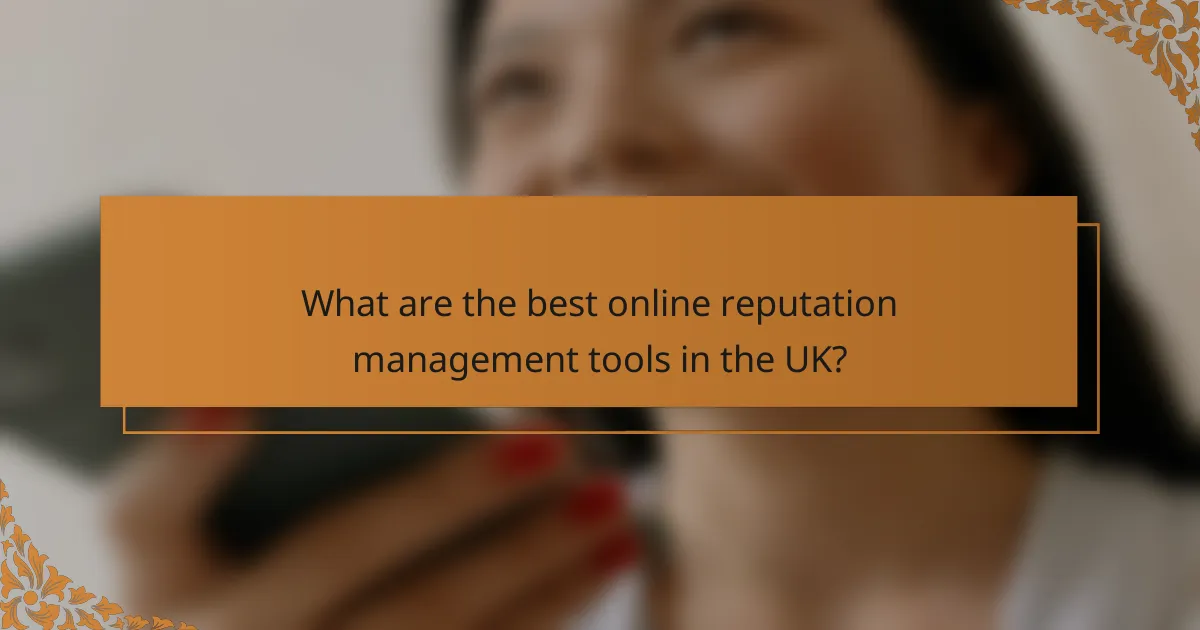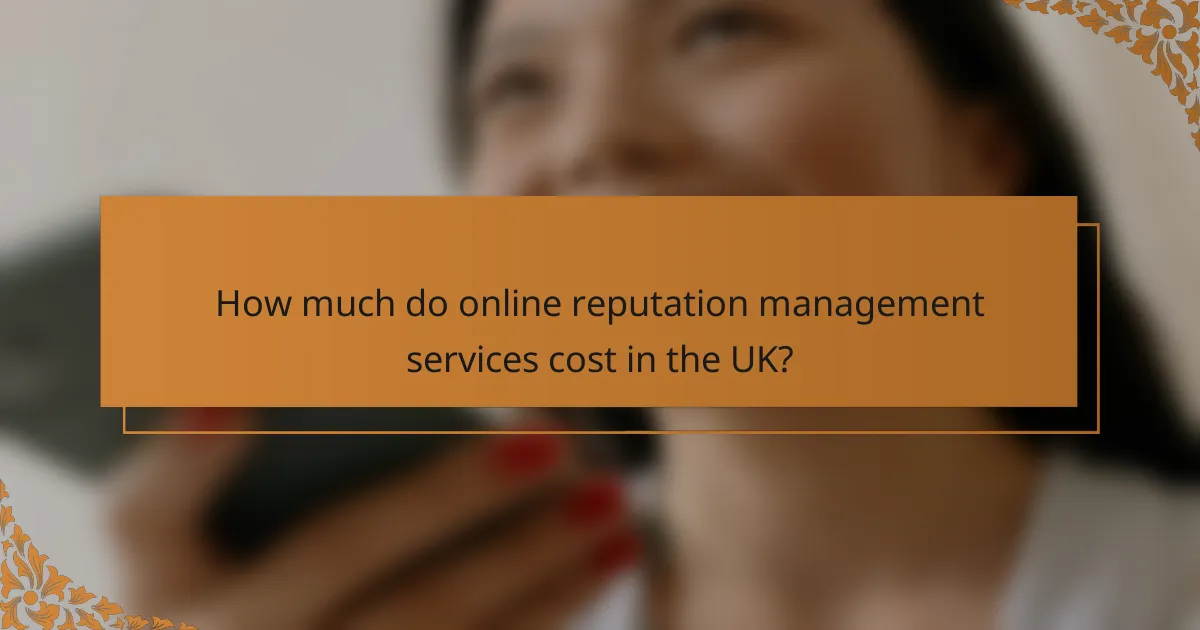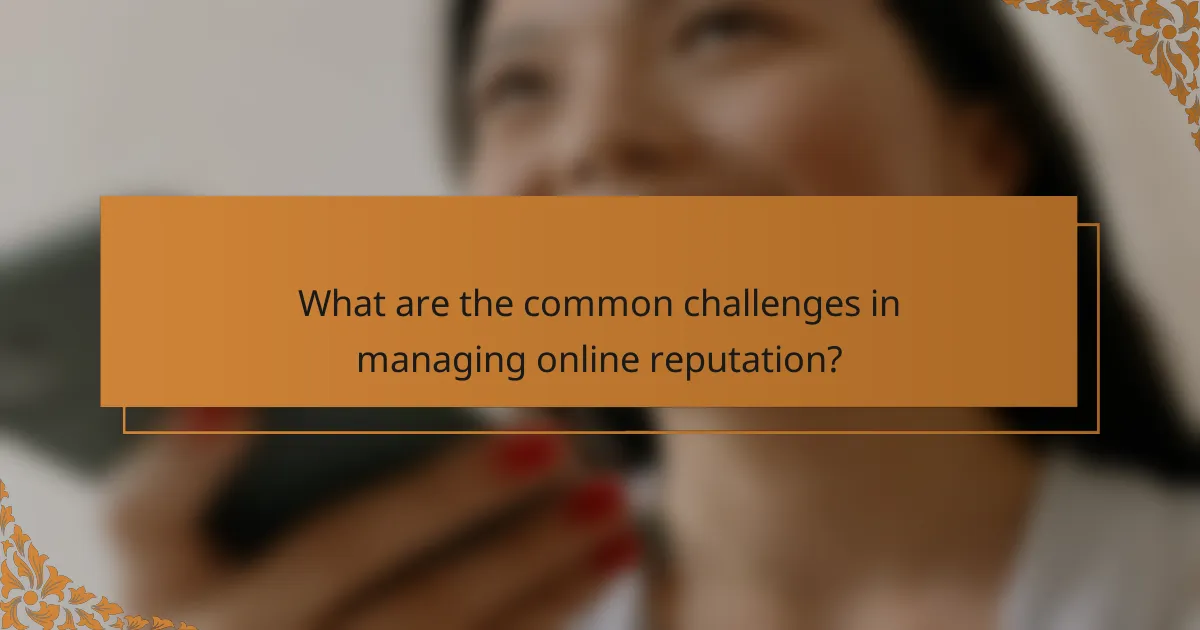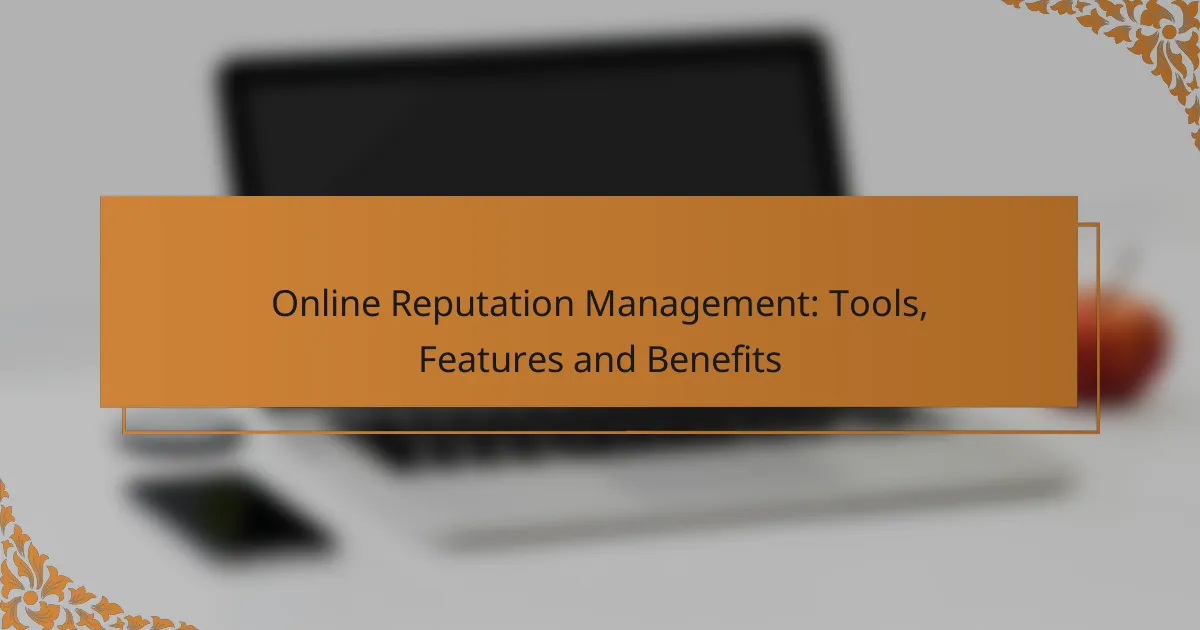Online reputation management tools are essential for businesses and individuals looking to monitor and enhance their online presence. By aggregating data from various sources, these tools enable users to track mentions, respond to feedback, and create positive content, ultimately shaping how they are perceived online. Selecting the right software involves focusing on features like review management, social media monitoring, and analytics to effectively manage your reputation.

What are the best online reputation management tools in the UK?
The best online reputation management tools in the UK help businesses and individuals monitor, manage, and improve their online presence. These tools vary in features, pricing, and effectiveness, making it essential to choose one that aligns with specific needs and goals.
BrandYourself
BrandYourself is a user-friendly platform designed to help individuals and businesses enhance their online presence. It offers services like personal branding, search engine optimization, and online profile management, making it easier to control what appears in search results.
Users can create a free account to start building their online reputation, but premium features, such as professional assistance and advanced analytics, come at a cost. This tool is particularly useful for job seekers and professionals looking to improve their visibility online.
Reputation Defender
Reputation Defender specializes in removing negative content from search results and improving online reputations. It provides services such as content removal, monitoring, and reputation repair, making it suitable for businesses facing significant online challenges.
While it can be effective, users should be aware of the costs involved, which can vary based on the extent of services required. It’s essential to assess the potential return on investment when considering this tool.
Trustpilot
Trustpilot is a review platform that allows businesses to collect and manage customer feedback. By encouraging satisfied customers to leave positive reviews, companies can enhance their online reputation and build trust with potential clients.
Businesses can respond to reviews, which helps demonstrate commitment to customer satisfaction. Trustpilot’s free and paid plans offer various features, making it accessible for small to large enterprises in the UK.
Google Alerts
Google Alerts is a free tool that allows users to monitor their online presence by setting up alerts for specific keywords, such as their name or business. This tool helps users stay informed about new mentions, enabling proactive reputation management.
While Google Alerts is simple to use, it may not capture all online mentions, so it should be used alongside other tools for comprehensive monitoring. Regularly checking alerts can help users respond quickly to any negative content.
Hootsuite
Hootsuite is primarily a social media management tool that also offers reputation management features. Users can monitor social media mentions, respond to comments, and analyze engagement metrics, which are crucial for maintaining a positive online image.
With various pricing plans, Hootsuite caters to different business sizes and needs. It is particularly beneficial for companies that rely heavily on social media for customer interaction and brand building.

How do online reputation management tools work?
Online reputation management tools work by monitoring, analyzing, and improving how a brand or individual is perceived online. They aggregate data from various sources, enabling users to track mentions, respond to feedback, and create positive content that enhances their reputation.
Monitoring online mentions
Monitoring online mentions involves tracking where and how a brand is discussed across the internet. Tools typically scan social media, blogs, forums, and review sites to gather this information. Regular monitoring helps identify trends, gauge public sentiment, and respond promptly to negative comments.
Effective monitoring tools can send alerts for new mentions, allowing businesses to stay proactive. Consider using platforms that offer sentiment analysis to better understand the tone of the discussions surrounding your brand.
Responding to reviews
Responding to reviews is crucial for managing online reputation, as it shows customers that their feedback is valued. Tools often provide templates and analytics to help craft appropriate responses to both positive and negative reviews. Aim to respond quickly, ideally within a few hours to a couple of days.
When addressing negative reviews, acknowledge the issue and offer a solution, which can help mitigate damage. For positive feedback, express gratitude and encourage further engagement. This approach fosters a positive community around your brand.
Content creation and promotion
Content creation and promotion are essential for building a positive online presence. Tools can assist in generating blog posts, articles, and social media content that highlight your brand’s strengths and values. Focus on creating high-quality, relevant content that resonates with your target audience.
Promoting this content through social media and email marketing can enhance visibility and drive traffic to your website. Regularly update your content to keep it fresh and engaging, which can help push down negative search results and improve overall reputation.

What features should I look for in reputation management software?
When choosing reputation management software, focus on tools that enhance your ability to monitor, manage, and improve your online presence. Key features include review management, social media monitoring, and analytics capabilities that provide actionable insights.
Review management
Review management tools help businesses track and respond to customer feedback across various platforms. Look for software that aggregates reviews from sites like Google, Yelp, and TripAdvisor, allowing you to manage your reputation in one place.
Consider features like automated alerts for new reviews and the ability to respond directly through the software. This can save time and ensure timely engagement with customers, which is crucial for maintaining a positive image.
Social media monitoring
Social media monitoring tools enable you to keep tabs on brand mentions and customer sentiment across platforms like Facebook, Twitter, and Instagram. Effective software should provide real-time alerts and sentiment analysis to help you gauge public perception.
Look for features that allow you to engage with users directly from the platform and analyze trends over time. This can help you identify potential issues before they escalate and capitalize on positive interactions.
Analytics and reporting
Analytics and reporting features are essential for understanding the effectiveness of your reputation management efforts. Choose software that offers customizable dashboards and detailed reports on key metrics such as review ratings, social media engagement, and sentiment trends.
Regularly reviewing these analytics can help you identify strengths and weaknesses in your online presence. Aim for tools that provide actionable insights, allowing you to adjust your strategies based on data-driven decisions.

What are the benefits of using reputation management tools?
Reputation management tools provide significant advantages for businesses by enhancing their online presence and credibility. These tools help monitor, manage, and improve how a brand is perceived by customers and the public, ultimately leading to better business outcomes.
Improved brand perception
Using reputation management tools can significantly enhance brand perception by actively monitoring online mentions and reviews. Businesses can respond promptly to negative feedback, demonstrating their commitment to customer satisfaction and quality service.
For instance, a company that addresses complaints on social media can turn a dissatisfied customer into a loyal advocate. Regularly updating content and engaging with audiences also helps shape a positive image over time.
Increased customer trust
Reputation management tools foster increased customer trust by showcasing positive reviews and testimonials prominently. When potential customers see a history of satisfied clients, they are more likely to choose that brand over competitors.
Additionally, transparency in addressing issues can build credibility. Businesses that openly share how they resolve problems often gain respect and loyalty from their audience, leading to higher conversion rates.
Enhanced visibility in search results
Effective reputation management can improve a brand’s visibility in search engine results. By optimizing content and managing online reviews, businesses can ensure that positive information ranks higher than negative content.
For example, regularly publishing quality articles and engaging with customers can push down unfavorable reviews in search results. This proactive approach not only enhances visibility but also drives more traffic to the company’s website, increasing potential sales opportunities.

How much do online reputation management services cost in the UK?
The cost of online reputation management (ORM) services in the UK can vary significantly based on the provider and the services offered. Generally, businesses can expect to pay anywhere from a few hundred to several thousand pounds per month, depending on the complexity and scope of the management required.
Monthly subscription models
Many ORM services operate on a monthly subscription basis, which typically includes ongoing monitoring, management, and reporting. Prices for these subscriptions can range from around £100 to over £1,000 per month, depending on the level of service and the size of the business. Higher-tier plans often offer more comprehensive features such as crisis management and advanced analytics.
When considering a subscription model, evaluate what specific services are included, such as social media monitoring, review management, and content creation. It’s essential to choose a plan that aligns with your business needs and goals.
One-time service fees
Some ORM providers offer one-time services, which can be beneficial for businesses needing immediate assistance with a specific issue, such as a negative review or a PR crisis. These one-time fees can range from £500 to several thousand pounds, depending on the complexity of the situation and the expertise required.
Before opting for a one-time service, ensure that the provider has a clear strategy for addressing your specific reputation issue and inquire about any follow-up support that may be necessary.
Cost comparison of popular tools
There are several popular ORM tools available, each with different pricing structures. For example, tools like BrandYourself and Reputation.com may charge monthly fees starting around £100, while more comprehensive platforms like Sprout Social can exceed £1,000 per month based on features and user counts.
When comparing these tools, consider factors such as ease of use, customer support, and the specific features that are most relevant to your reputation management strategy. A side-by-side comparison can help you identify the best value for your investment.

What are the common challenges in managing online reputation?
Managing online reputation involves navigating various challenges, including negative reviews, misinformation, and social media backlash. These issues can significantly impact a brand’s image and customer trust if not addressed effectively.
Negative reviews and feedback
Negative reviews can harm a business’s reputation, especially if they are numerous or prominently displayed on major platforms. Addressing these reviews promptly and professionally is crucial; this may involve responding publicly or privately to the reviewer. Businesses should aim to resolve issues and demonstrate commitment to customer satisfaction.
Misinformation and false claims
Misinformation can spread quickly online, leading to misunderstandings about a brand or product. Companies should monitor their online presence regularly to identify and correct false claims. Engaging with customers and providing accurate information can help mitigate the effects of misinformation.
Social media backlash
Social media can amplify negative sentiments rapidly, making it essential for brands to have a proactive strategy in place. This includes monitoring social channels for mentions and responding to criticism constructively. Developing a crisis management plan can prepare businesses for potential backlash and help maintain their reputation.
